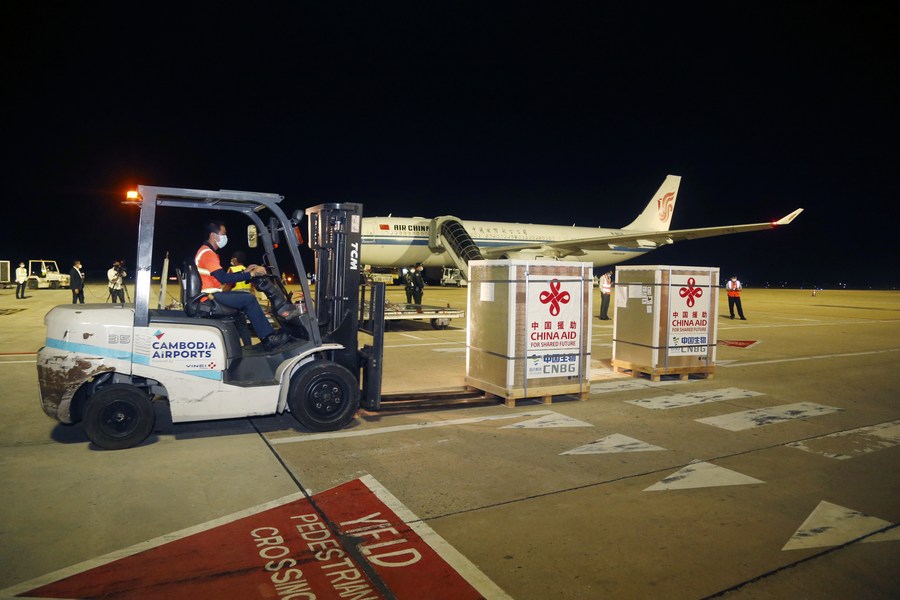-- The world needs genuine multilateralism, and all countries should refrain from pursuing unilateralism and hegemonism, and should not use multilateralism as a pretext to form small circles or stir up ideological confrontation, Chinese President Xi Jinping has said.
-- China has shown its "great willingness to guide efforts towards a new paradigm in the international arena, where cooperative work is the only path towards a prosperous global future," said Gonzalo Tordini, director of International Relations at the Arturo Jauretche National University in Greater Buenos Aires.
-- "In an effort to revive the multilateral and cooperative spirit of the world, President Xi is trying to push the world to come together, and major countries help each other especially in the midst of this challenging pandemic," said Mueen Batlay, director of the Institute of Management Sciences at Hamdard University in Pakistan.
BEIJING, May 8 (Xinhua) -- The world needs genuine multilateralism, and all countries should refrain from pursuing unilateralism and hegemonism, and should not use multilateralism as a pretext to form small circles or stir up ideological confrontation, Chinese President Xi Jinping has said.
The vision resonated with the wider public with scholars and experts worldwide holding that true multilateralism should prevail over unilateral interests and narrow regional groupings, and play a due role in promoting global cooperation and solidarity, especially in combating the COVID-19 pandemic and climate change.
GENUINE MULTILATERALISM
During a phone conversation with United Nations (UN) Secretary-General Antonio Guterres on Thursday, Xi noted that pursuing multilateralism is inseparable from the UN's mission, international law and cooperation among countries, and multilateralism has received an increasing amount of support.
"I think the Chinese president is telling the world how China perceives and practices true multilateralism," said Islam Ayadi, assistant professor of political science at the Arab American University in Palestine.
"China believes that true multilateralism means abiding by the purposes and principles of the UN Charter, safeguarding the international system with the UN at its core, and promoting the democratization of international relations," she told Xinhua.
"Building small circles in the name of multilateralism is in fact fake multilateralism," she said, adding that such a move is actually returning to unilateralism in nature.
President of the 75th session of the UN General Assembly Volkan Bozkir stressed on Friday that "strong and effective multilateralism, based on the purposes and principles of the Charter of the United Nations, international law and justice are the foundations for security, stability, peace and prosperity."
"Multilateralism plays a crucial role in fostering dialogue and trust, managing security challenges, such as terrorism and weapons proliferation. And it provides a framework for states to resolve disputes peacefully and without coercion," he said, adding that the multilateral system benefits all, from small states to the largest ones.
Similarly, Tatiana Valovaya, director-general of the UN Office at Geneva, pointed out that to make multilateralism trustworthy, all the members within the multilateral system should be given an equal voice.
"We need (to) give a voice to all the members of the multilateral system. All member states should have an equal voice, and we have to listen to everybody," he said.
"It's very important to strengthen multilateralism for this point of view, to make it inclusive, to make it integrated, to make it networking, and working with member states exactly in strengthening this multilateral approach," the official added.
"It is necessary to avoid isolationism and unilateralism. Global solidarity and South-South cooperation are key, not only to confront current challenges that require a multilateral response, but also to prevent future global problems," said Gonzalo Tordini, director of International Relations at the Arturo Jauretche National University in Greater Buenos Aires.
China has shown its "great willingness to guide efforts towards a new paradigm in the international arena, where cooperative work is the only path towards a prosperous global future," he added.
COOPERATION ON FIGHTING COVID-19
"In an effort to revive the multilateral and cooperative spirit of the world, President Xi is trying to push the world to come together, and major countries help each other especially in the midst of this challenging pandemic," said Mueen Batlay, director of the Institute of Management Sciences at Hamdard University in Pakistan.

A worker transports Sinopharm COVID-19 vaccine at the Phnom Penh International Airport in Phnom Penh, Cambodia, April 28, 2021. (Photo by Phearum/Xinhua)
"President Xi wants a world of cooperation and mutual respect which can fight against any global challenge together," he said, adding that Xi has forged a path towards this through China's efforts to promote international cooperation by helping others against COVID-19.
"I firmly believe that the world of cooperation will surely prevail over petty efforts of adversarial politics and narrow regional groupings," he said. "The time has come for the multilateral, cooperative and supportive spirit that President Xi calls for in international relations."
"The world is wounded, exhausted and economically impoverished. It needs the healing hand of cooperation, not confrontation and political manipulation," the scholar said.

A health worker prepares a dose of Sinopharm COVID-19 vaccine during a vaccination campaign in Palestine's West Bank city of Nablus, April 4, 2021. (Photo by Ayman Nobani/Xinhua)
"If we are to have a chance of dealing with challenges such as the pandemic, climate change and poverty, President Xi's offer of friendship and partnership must be accepted. The future belongs to the unifiers, not the dividers," he added.
The global health and economic crisis generated by COVID-19 has highlighted the need for greater international cooperation and multilateralism, Tordini said.
"China has been one of the main promoters of international cooperation in recent years, and its willingness to work collaboratively with other countries has been especially clear during the pandemic," he said, adding that the pandemic did not interrupt collaboration, but intensified it.
CLIMATE CHANGE
As humankind has abused its environment and seen the consequences brought by climate change and COVID-19, multilateralism must prevail over unilateral interests, said Jose Ignacio Martinez Cortes, a researcher at the National Autonomous University of Mexico.
"Today we see that if we follow a unilateral path of not tackling climate change over the next two generations, then we will have lands devastated by the phenomenon of droughts or floods," he said. "Therefore, multilateralism must prevail beyond unilateral interest."
He added that countries are now faced with two major challenges: climate change and the COVID-19 pandemic. Yet the United States always wants to "put its interests above multilateralism," and that could lead to "confrontation and wasting time in" addressing these two issues.

Aerial photo taken on Feb. 24, 2021 shows a molten-salt solar thermal power plant in Dunhuang, northwest China's Gansu Province. (Xinhua/Ma Xiping)
"If we continue to follow Washington's path, we will be moving through unilateralism and nationalism, and of course the hegemony of Washington. If we go along with what China proposes around the UN proposal, we can multilaterally confront these two (challenging) situations that we are undergoing," he said.
In this regard, the United States has shown an unfortunate willingness at times to deal with global challenges using small, closed groupings and small cliques, said Sourabh Gupta, a senior fellow at the Washington-based Institute for China-America Studies.
"It did so in the area of global public health by prioritizing the Quad framework -- and not the UN or the World Health Organization -- as the primary means for vaccine dissemination in the Indo-Pacific and other developing nations," he added.
"Global challenges require global solutions and global stewardship. Hopefully, it will bear this principle in mind in the context of exercising a co-leadership role to tackle the global climate challenge, going forward," Gupta said.

Photo taken on Dec. 3, 2020 shows a production line of new-energy vehicles in Kunming, southwest China's Yunnan Province. (Xinhua/Jiang Wenyao)
As the largest developing country in the world, China has increased its contributions to achieving the highest reduction in CO2 emissions in the world and will achieve carbon neutrality from carbon peaking in the shortest time in the world's history, said Ayadi.
China has already pledged to peak carbon dioxide emissions by 2030 and achieve carbon neutrality by 2060, which is a much shorter time span than those proposed by many developed countries.
"This demonstrates China's commitment to making more contributions to tackling global climate change and building up its image as a responsible major country," she said. ■




